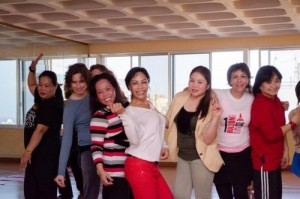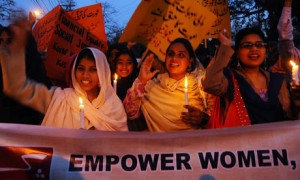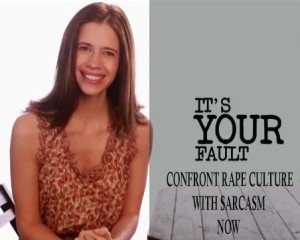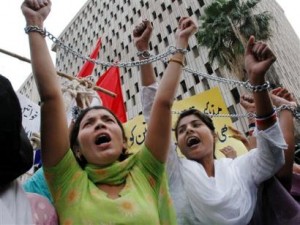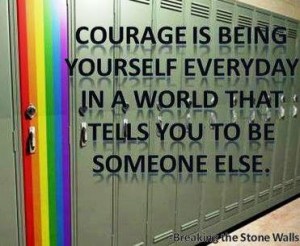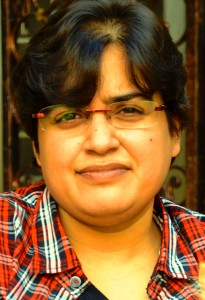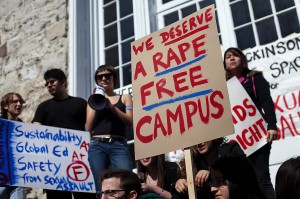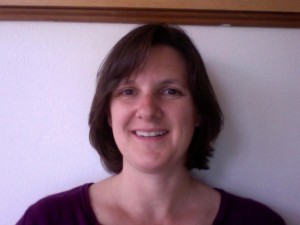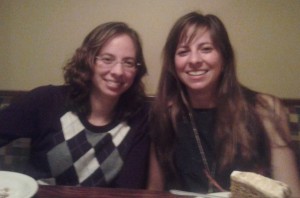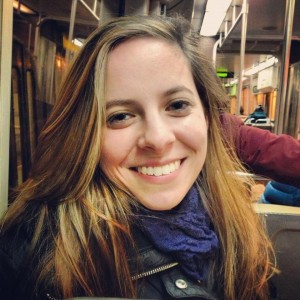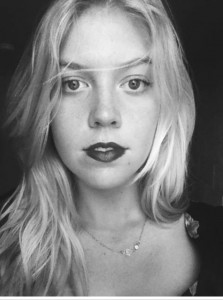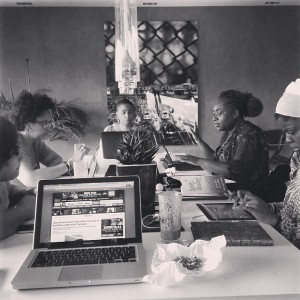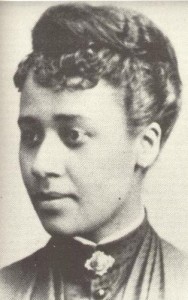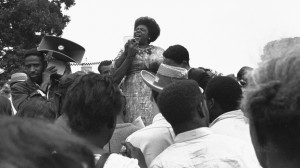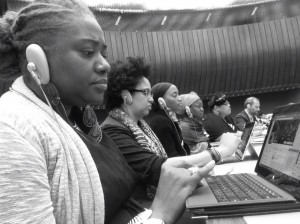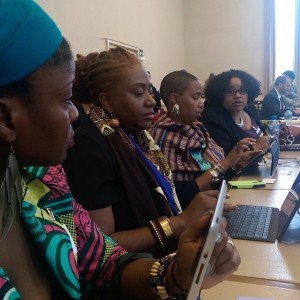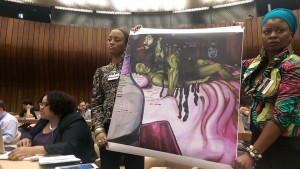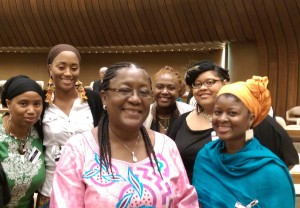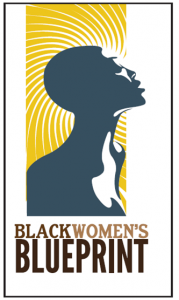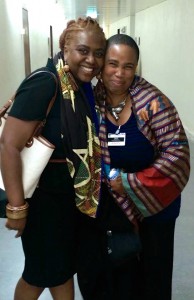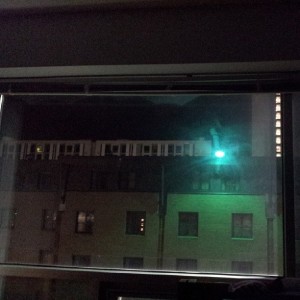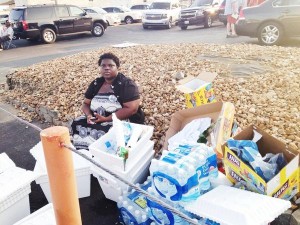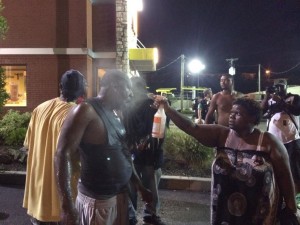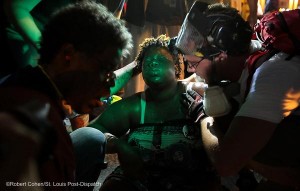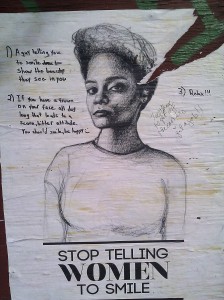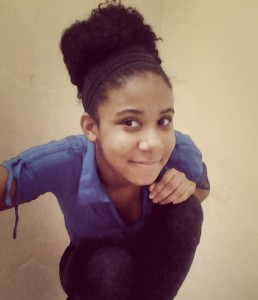I write libation to all those known and unknown ancestors across lifetimes that have gone before me and upon whose shoulders I literally stand.
Tuesday, February 18, 2014 is the 80th birthday anniversary of Audre Lorde, the self-defined Black Lesbian Feminist Mother Warrior Poet. In her short lifetime in the physical form, Sister Lorde published ten volumes of poetry and five works of prose, including Zami: A New Spelling of My Name; The Cancer Journals; A Burst of Light; Sister Outsider; Our Dead Behind Us; From a Land Where Other People Live; Cables to Rage; Uses of the Erotic: The Erotic as Power; and The Marvelous Arithmetics Of Distance. She is credited with co-founding, with Barbara Smith, Kitchen Table: Women of Color Press, the first U.S. publisher by, for, and about women of color. In her lifetime, Sister Lorde was a recipient of many distinguished honors and awards, including being named the New York State Poet Laureate from 1991-1993. Toward the very end of her life, she was given and fully embraced the African name Gamba Adisa, which means “Warrior: She Who Makes Her Meaning Clear.” She died on November 19, 1992, after a 14-year battle with breast cancer, which metastasized to her liver. She is recognized as one of the most important radical Black feminists of the past half century by Drs. Beverly Guy-Sheftall, Johnnetta Betsch Cole, and the late Rudolph P. Byrd in their edited volume I Am Your Sister: Collected and Unpublished Writings of Audre Lorde. Today, The Feminist Wire takes a bold step by launching a global (US, Europe, and the Caribbean) two-week forum to celebrate Sister Lorde’s life and living legacy, which continuously touches hundreds of thousands of people around the world. It is a profound responsibility to be here with all of you who will read these words in this cyberspace called The Feminist Wire on the 80th birthday anniversary of our beloved Audre Lorde. In this co-created sacred space in honor of Daughter, Sister, Mother, Friend, Comrade, Partner, Teacher Audre Lorde, I write libation in the name of her global living legacy.
My Personal Is Political
In Dagmar Schultz’ award-winning, internationally acclaimed film Audre Lorde, The Berlin Years (1984-1992), Sister Lorde said,
I started out like all of us start out, a coward…afraid. It‘s not to say that I’m not afraid now. Whether I’m afraid or not, I count less. I value myself more than I value my terrors. It does not mean that I don’t have them. Once I take that position, I can look at them and see what it is that they teach me.
In many ways, the seed for this forum began in February 2012, when my dear sister/friend Lynn Roberts, an assistant professor in the School of Public Health at Hunter College, told me about the Women’s and Gender Studies Department’s plans to celebrate Audre Lorde’s life and legacy to commemorate the 20th anniversary of her passing into the Spirit world. Without hesitation, I immediately expressed an interest in being involved in any way possible. Several months later, Lynn asked me to serve on the media committee and present on one of the panels. Fast forward to August 2012, when my new colleague and subsequent big sister/friend Dr. Joyce A. Joyce asked me if I wanted to teach a course on Audre Lorde at Temple University in the spring 2013 semester. Joyce is the chairperson of both the Women’s Studies Steering Committee and the English Department at Temple. She knew that I was long-term cultural worker whose cultural productions and writing over the past 20-years were tremendously informed and influenced by both Audre Lorde and Toni Cade Bambara. While we both respected each other immensely and knew each other tangentially for many years, we never worked together. At the time of her inquiry, we were just beginning the fall semester of my first year teaching courses in both Women’s Studies and LGBT Studies at Temple. Needless to say, all I wanted to do was focus on persevering in the fall semester. However, true to her visionary form, Dr. Joyce was envisioning the 2013 spring semester. At best, the thought of creating and teaching an inaugural graduate and undergraduate seminar that would focus on one of my all time heroes’ life and living legacy was daunting. And yet, I knew it was a gift of an opportunity that I could not refuse. I was afraid. I knew I didn’t want to say, “No,” but I was terrified to say, “Yes.” I didn’t allow my fears to completely paralyze me. I faced my deep-seated fears of complete failure. I named them to myself; and a few chosen others in my sacred circle. Equally as important, Dr. Joyce never waivered in her belief and full support of my carrying out this most auspicious task, which was an invaluable gift. I went into deep meditation in my spiritual tradition based upon the teachings of Buddha. And, I called upon Sister Lorde’s written words, which have informed my path for over two decades.
We can learn to work and speak when we are afraid in the same way we have learned to work and speak when are tired. For we have been socialized to respect fear more than our own needs for language and definition and while we wait in silence for that final luxury of fearlessness, the weight of that silence will choke us…”[i]
Dr. Joyce and I moved forward together. The title and course description for my inaugural Audre Lorde: The Life and Work of A Silence Breaker seminar was conceived one month shy of the 20th anniversary of Sister Lorde’s passing on November 17, 1992 and on the eve of Hunter College’s Women’s and Gender Studies department’s national celebratory gathering.
The Lorde was working with me in her mysterious and magical ways.
That was not the first time that I called upon Audre Lorde’s words to help me face my fears. It was almost exactly 24-years ago when her words first anointed me. I have been walking with Sister Lorde since April 1990 when a friend and former colleague Hollie Van Ness first introduced me to Sister Outsider, Lorde’s classically timeless book of essays. I was a very frightened, young 21-year old who was struggling with coming out as a lesbian. I don’t believe I had ever heard of Audre Lorde and if I had, I definitely didn’t know anything about her trailblazing life and work. Reading Sister Outsider, most especially her essay “Transformation of Silence Into Language and Action,” forever changed the trajectory of my life. My father, and confidante, Michael Simmons, and my teacher, mentor, and big sister friend, Toni Cade Bambara, both gave me invaluable tools to continuously use what evolved into my Black feminist lesbian journey. Sight unseen, Audre Lorde’s words gave me the roadmap from which I would chart my own path as an unapologetically out, undeniably race conscious Black woman, and non-negotiable feminist lesbian. If there was any doubt, my father did all that he could to eliminate it. However, it was Sister Lorde whose words convinced me beyond one shadow of a doubt that I wouldn’t ever, ever have to choose between my race, my gender, and/or my sexual orientation. They were one. I was….I AM WHOLE. I was metaphorically baptized in the Lordean Ocean. This baptism led me to create and name my production company AfroLez® Productions. This was followed by my coining the term AfroLez®femcentric to define the cultural conscious role of Black/African-descendent identified women who are Afrocentric, feminist, and lesbian. Shortly afterwards, I produced and directed my very first short video, Silence…Broken, which was conceived in a Toni Cade Bambara scriptwriting class at Scribe Video Center in Philadelphia. Silence…Broken, is an experimental narrative short that visually builds upon “Transformation of Silence Into Language and Action.” It is about an African American lesbian’s refusal to be silent about racism, sexism, and homophobia. Featuring the poetry of acclaimed poet and my sister Jourdan Imani Keith, Silence…Broken is dedicated to the memory of Audre Lorde.
Silence is never without fear – of visibility, of the harsh light of scrutiny and probable judgment, of unspeakable pain from the judgment, and of death…We have lived through all of those already, in silence, except death. And I remind myself all the time now that if I were to have been born mute, or had maintained an oath of silence my whole life long for safety, I would still have suffered, and I would still die. It is very good for establishing perspective…[ii]
I never had the great fortune of being in the presence of or meeting Sister Lorde. Over the years, I have spoken and written extensively about how Sister Lorde’s words played a pivotal role in my being able to break what for some are unbreakable silences. I credit how Sister Lorde’s words ignited the fire that enabled me to publicly identify as both an incest and a rape survivor. I can also publicly share the details surrounding my safe and legal abortion, which could’ve resulted from my rape or from my having pleasurable consensual sex less than 24-hours after my rape with a different man. I’m able to challenge the homophobic questions, which connect my Black feminist queer identity to my having been repeatedly molested as a child and raped as a very young woman. Without hesitation, I encourage people to compare the global statistics of violence against women and children and compare those rates to the numbers of LGBTQIA people in the world. If sexual violence “made” people queer, most of us in the world would be queer. I also don’t play into the game of focusing on pathologizing queer identity, instead of working toward eradicating sexual violence. Sister Lorde empowered me to say that I am a Black lesbian because I love women, not because I hate men. I do not want to imply that this work happened overnight. It absolutely did not. The aforementioned paragraph sums up years of continuous extensive, hardcore, and non-negotiable self-work. I am an ongoing work-in-progress. Sister Lorde never said it would be easy, and she was right. It isn’t. It’s relentless and exhausting work, but the rewards are priceless.
Don’t Mythologize Me! ~ A Litany for Survival: The Life and Work of Audre Lorde
For years, I have worshipped at the altar of The Lorde, as I intentionally refer to her from time to time. Over time and most recently within the past few months especially, I learned that this was both a betrayal to her life and to myself. I am unequivocally clear that Sister Lorde was and dare I say her spirit still is a force to be reckoned. However, as long as any of us place her “up there,” we create a paradigm that foremost, doesn’t honor the sacred power that she challenged each one of us to tap within ourselves. Secondarily, we are not honoring her living legacy when we mythologize her. We can easily explain all of the ways the Warrior Poet consistently broke her silences in the face of tremendous fear and terror, while simultaneously giving both a context and justification for why we can’t or don’t. We will quote our favorite Lordean passages and include her name in the roll call of amazing social change agents who transformed the world. Make no mistake: she is at the top of the list of those names for me. But what does it mean if we are only talking the talk and not walking the talk? Often, many of us don’t truly take to heart and spirit what it took for Sister Lorde to literally “transform her own silence into righteous engaged anger, language and international activism” during her 58-year span of life. We don’t remember that she often told us that she transformed her silence into language and action in spite of her fears and not feeling secure. One of her many long term sister-friends and colleagues, Dr. Johnnetta Betsch Cole wrote,
Audre Lorde could be fierce, but she was rarely secure. The way that she moved through the world reminds us that greatness is not synonymous with perfection. Indeed, to be human is to be flawed.[iii]
Sister Lorde said and asked,
I am doing my work…Are you?
This forum was originally conceived as an opportunity to solely feature essays/poetry/love notes by the interested students and all of the invited guest lecturers — Alexis Pauline Gumbs, Melinda Goodman, Elizabeth Lorde-Rollins, Darnell Moore, and Beverly Guy-Sheftall — in my Lorde seminar at Temple. I initially viewed the forum as part of the tradition of Toni Cade Bambara‘s Tales and Stories for Black Folks. However, after some thought, I realized that this envisioned forum would be an amazing opportunity to widen the net and highlight some of the many voices who knew Sister/Mother/Teacher/Poet Audre Lorde; while simultaneously celebrating the amazing Lordean scholarship, cultural work, and activism that has happened or is happening.

Students & friends after Elizabeth Lorde-Rollins & Melinda Goodman’s guest lecture in Simmons’ Lorde seminar
This forum is a humble attempt to celebrate and uplift the groundbreaking intersectional work to centralize the margins within the margins in the United States, the Caribbean, and Germany. We will feature meditations, critical essays, sermons, personal reflections, poetry, love notes, and videos by a wide range of diverse people The contributors range in age from their early 20s to their early 80s. We are straight, gay, lesbian, bi, cis, trans, feminine, masculine, Black American, Black European, Black Caribbean, Asian African European, white American, and/or white European. I haven’t even addressed spiritual/religious traditions. Many of the contributors knew Sister Lorde personally, while others only recently encountered her within the past year through her written and spoken words. The two “Feminists We Love” we will feature in this celebratory forum will be intimate video interviews with Sister Lorde’s daughter, Elizabeth Lorde-Rollins, M.D., (February 21, 2014), and her partner in the latter years of her life, Gloria I. Joseph, Ph.D., (February 28, 2014). As diverse as this global collective of over 40 individuals is, we’re not as diverse as we could be. In her own physical lifetime and twenty-two years as a beloved and cherished ancestor, Sister Lorde’s imprint is far reaching. TFW is only able to touch the tip of a huge surface that covers so many diverse individuals from around the world. Writing as the organizer and lead editor of this forum, I can attest at 3:02 a.m. this February 18, 2014 morning, that we’ve intentionally stretched ourselves as far as we can go while simultaneously carrying out the invisible feminist labor whose currencies are non-attached love and compassionately radical, anti-imperialist, anti-racist, anti-sexist, anti-homophobic, anti-transphobic social change. The Audre Lorde Forum Team is a TFW village that began with Ness white, my former graduate student in both my Lorde seminar and “Introduction to Feminist Studies” seminar at Temple University. Ness’ invaluable assistance during summer 2013 and for a significant part of fall 2013 transformed into them becoming a co-editor. The members of TFW Editorial Collective who, when I put out the call, immediately said, “Sign me up in the service of The Lorde,” are Heather Laine Talley, Heidi Renee Lewis, Brooke Elise Axtell, Alexis Pauline Gumbs, Darnell L. Moore, David J. Leonard, Kai Green, Mecca Jamilah Sullivan, and TC Tolbert, with Stephanie Gilmore. Tamura A. Lomax and Monica J. Casper always hold it down as and when necessary. Trust that we are still working on this forum. On behalf of TFW, I extend deep heartfelt gratitude to Dagmar Schultz who graciously and generously granted us permission to use the majority of the featured photos in this forum on Sister Lorde from her personal library. A special thanks to my student Riannon Caflisch for her German translation skills. We are indebted to all of the incredible contributors who put so much time, love, care, and respect into their submissions. It has been a journey from the invitation to the publication. Today is day one of a dip into a vast and very deep Lordean Ocean that will hopefully strengthen or ignite your compassionately righteous fire to make this world a more humane place for all of its inhabitants. We hope you will continue to swim with all of us to the other side of this small and yet, all encompassing section of the vast Lordean Ocean. In the Hands of Afrekete! Ashe’.
The post The Lorde Works in Mysterious and Magical Ways: An Introduction to TFW’s Audre Lorde Forum appeared first on The Feminist Wire.



